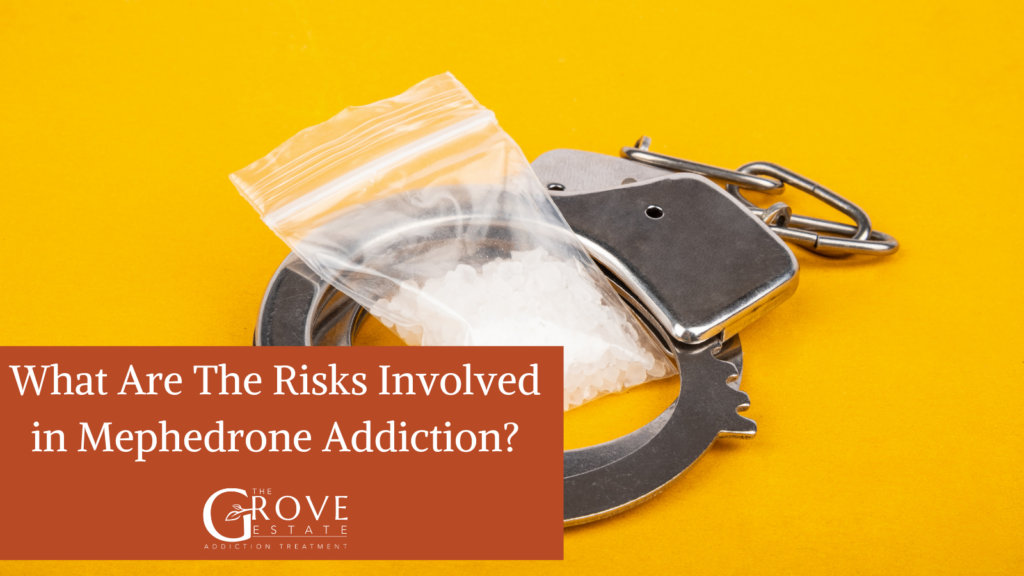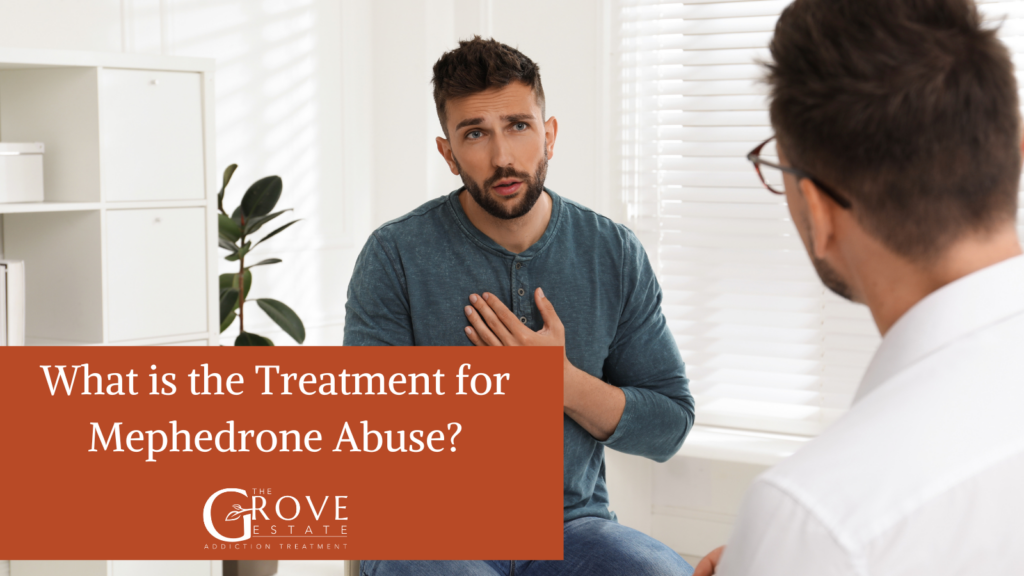Mephedrone and mephedrone addiction are a relatively new concept. According to a comparative review ‘Mephedrone: use, subjective effects and health risks’ carried out by Winstock A, et al. most users of the drug used it first between 2008 and 2010.
Abuse and addiction to the substance are still under study, and there is a controversial relationship between the drug and the risk of neurotoxicity, headaches, organ damage, and insomnia.
Treatment for Mephedrone addiction includes complex and personalized treatment plans, and inpatient and outpatient rehab facilities. Cognitive behavioral therapy is also an important part of the treatment plans.
What is Mephedrone?
Mephedrone is a synthetic stimulant drug. It belongs to a group of substances known as substituted cathinone, which are derivatives of the naturally occurring stimulant found in the khat plant. It is also classified as an amphetamine which are drugs that stimulate the central nervous system.
The United States considers it a Schedule 1 Controlled Substance (substances that have no accepted medical applications and pose a high risk of abuse), and it has been banned in the country since the passage of the Synthetic Drug Abuse Prevention Act of 2022.
Mephedrone gained popularity in the mid-2000s as a recreational drug due to its euphoric and stimulating effects, which are similar to those of MDMA (ecstasy) and cocaine. Mephedrone has always been used recreationally, with no history of any medical use. It typically comes in the form of white powder or crystals, which is ingested orally, snorted, injected, or smoked.
Mephedrone is associated with various adverse effects including increased heart rate, elevated blood pressure, agitation, anxiety, paranoia, hallucinations, and even in severe cases, psychosis. Long-term use or abuse of the substance increases the chances of addiction, cardiovascular issues, and mental health diseases.
What is Mephedrone Addiction?
Mephedrone addiction refers to the compulsive and uncontrollable use of mephedrone despite the negative consequences on physical health, mental well-being, relationships, work, or other areas of life. Like other addictive substances, mephedrone can lead to tolerance, dependence, and withdrawal symptoms, all of which contribute to the cycle of addiction. However, the effect is not as strong as that of other amphetamines and cocaine.
Many experts argue that it is too early to say whether mephedrone is addictive, because it is still too recent to study its long-term use. However, several studies show that the drug has the capacity to cause dependence. Users tend to feel that they cannot get the same euphoria and enjoyment without the drug.
Signs of Mephedrone Addiction
People with long-term usage of Mephedrone tend to present with the following signs:
- Enlarged Pupils
- Weight loss
- Mood changes
- Talkativeness
- Changes in self-care and sleep habits
- Participation in risky and criminal behavior.
Learning these signs makes it easier to seek help when necessary.

What Are The Risks Involved in Mephedrone Addiction?
The effects of Mephedrone are transient, and evidence shows that users frequently reuse the drug to maintain the high. This increases the chances of abuse and addiction. Frequent usage of this drug is also linked to the following risks:
Risk of Overdose
Mephedrone is a commonly used recreational drug in the United States and is linked to several deaths. Long-term usage of this drug causes tolerance which increases the risk of an overdose.
An overdose of mephedrone is linked with several life-threatening conditions including seizures and respiratory failure.
Addiction and Dependence
Continued use of mephedrone leads to the development of tolerance, with users needing increasing amounts to achieve the desired effects. Tolerance increases the chances of dependence, characterized by withdrawal symptoms when mephedrone use is reduced or discontinued. Addiction and dependence lead to compulsive drug-seeking behavior, impaired control over use, and negative consequences of various aspects of life.
Psychological Risks
Mephedrone abuse can have profound effects on mental health, contributing to the development of anxiety disorders, panic attacks, paranoia, hallucinations, and psychosis. Long-term mephedrone use may exacerbate existing mental health conditions or precipitate the onset of new psychiatric disorders.
Physical Health Risks
Studies on the use of mephedrone link it with various physical health problems, including cardiovascular issues such as increased heart rate, elevated blood pressure, chest pain, and irregular heartbeat. According to a 2016 study by Karila et al., ‘The effects and risks associated to mephedrone and methylone in humans: A review of the preliminary evidence’ Mephredone also seems to be linked to other chronic conditions. However, there is not enough evidence to back these claims.
Mephedrone addiction has devastating effects on an individual’s physical and mental health, relationships, and overall quality of life. Seeking professional help and support is crucial for individuals struggling with mephedrone dependence and addiction.

What is the Treatment for Mephedrone Abuse?
Individuals with mephedrone addiction are often overwhelmed with the condition. Fortunately, there are available treatment options that help manage symptoms and maintain sobriety. Here are the treatment options available for managing mephedrone addiction:
Detox Program
Frequent use of mephedrone causes dependence. Abruptly stopping the use of the drug induces withdrawal symptoms. Some of the withdrawal symptoms include cravings, drowsiness, nasal congestion, agitation, depression, anxiety, and impaired concentration.
Detox programs are meant to help with these symptoms. Healthcare professionals slowly wean patients off the drug while monitoring vital signs. They use medications to combat the effect of difficult withdrawal symptoms.
Residential Treatment Program
Also known as inpatient programs, this treatment option lets people with mephedrone get help at specialized treatment facilities for designated periods. Experts provide round-the-clock care and supervision in a structured and supportive environment, which is beneficial for individuals with severe addiction,
Inpatient programs offer a comprehensive range of services, including medical detoxification, individual and group therapy, behavioral therapies, medication management, recreational activities, and holistic therapies.
Outpatient Treatment Programs
Outpatient treatment programs allow individuals with mephedrone addiction to receive treatment while living at home and maintaining their daily routines. These programs offer flexibility in scheduling therapy sessions and other treatment activities, making them suitable for individuals with mild to moderate addiction who have supportive home environments and strong social networks.
It also provides opportunities for individuals to apply the coping skills and strategies they learn in therapy to real-life situations, helping them develop resilience and self-efficacy in managing triggers and cravings.
Behavioral Therapies
Various behavioral therapies, such as cognitive-behavioral therapy (CBT), contingency management, and motivational interviewing, are effective in treating mephedrone addiction.
What are the long-term effects of mephedrone addiction on mental health?
Long-term mephedrone addiction can significantly impact mental health, leading to persistent anxiety, depression, paranoia, and hallucinations. Some individuals may develop psychosis, characterized by delusions and disorganized thinking, which can require intensive psychiatric intervention.
Can mephedrone addiction lead to financial difficulties?
Yes, mephedrone addiction can lead to financial difficulties as individuals may prioritize purchasing the drug over other essential expenses such as bills, groceries, or rent. Additionally, legal consequences resulting from mephedrone possession or distribution can incur hefty fines and legal fees.
Is it possible to overdose on mephedrone?
Yes, it is possible to overdose on mephedrone, which can lead to severe medical complications, including cardiovascular issues, seizures, hyperthermia, respiratory depression, coma, and death. Overdose risk increases with higher doses and when mephedrone is combined with other substances.
How does mephedrone addiction affect relationships with family and friends?
Mephedrone addiction can strain relationships with family and friends, leading to mistrust, conflict, and emotional distancing. Individuals may prioritize drug use over spending time with loved ones, leading to feelings of abandonment and resentment among family members and friends.
What role does aftercare play in mephedrone addiction recovery?
Aftercare plays a crucial role in mephedrone addiction recovery by providing ongoing support, resources, and coping strategies to maintain sobriety after completing formal treatment. Aftercare options may include attending support groups, participating in therapy sessions, and engaging in healthy lifestyle activities to promote overall well-being.
How does Mephedrone addiction impact family relationships?
Mephedrone addiction significantly impacts family relationships, leading to strained communications, trust issues, and emotional distress among family members. The National Center for Biotechnology Information (NCBI) highlights that addiction can disrupt family dynamics, creating a hostile or neglectful environment that affects everyone involved. Family members may feel helpless, frustrated, or even responsible for their loved one’s addiction, complicating the emotional landscape at home.
Engaging in family integration therapies as part of the addiction treatment can be crucial for healing and rebuilding these relationships. Such therapeutic approaches facilitate understanding, improve communication, and help family members learn supportive behaviors while setting healthy boundaries. According to the NCBI, involving the family in the treatment process not only supports the individual’s recovery journey but also aids in the emotional healing of the family as a whole, fostering a stronger support system.
Can addiction to Mephedrone lead to the use of other drugs?
Yes, addiction to Mephedrone can sometimes lead individuals to experiment with or switch to other substances, including PCP addiction. According to the National Center for Biotechnology Information (NCBI), individuals may seek out other drugs to replicate or enhance the effects of Mephedrone, particularly if they build a tolerance or if Mephedrone becomes difficult to obtain. This behavior increases the risk of polydrug use, which complicates the addiction and can exacerbate health risks.

Share This Post



